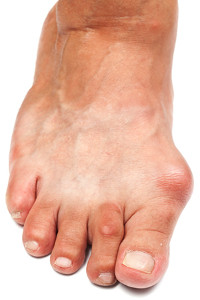 A bunion is considered to be a deformity of the bone. It appears as a protrusion on the side of the big toe, and is often swollen and painful. It is possible for the foot to change shape, and the style of the shoes may have to be altered. The reasons bunions develop can include genetic factors, wearing shoes that fit incorrectly, or medical conditions such as gout or rheumatoid arthritis. This condition can be treated by using bunion pads or wearing custom made orthotics. These may be helpful in alleviating pressure on the foot that comes from the bunion. If this ailment is causing severe pain and daily activities are difficult to complete, surgery may be a consideration for permanent removal of the bunion. Please consult with a podiatrist if you are afflicted with a bunion, and would like additional treatment options.
A bunion is considered to be a deformity of the bone. It appears as a protrusion on the side of the big toe, and is often swollen and painful. It is possible for the foot to change shape, and the style of the shoes may have to be altered. The reasons bunions develop can include genetic factors, wearing shoes that fit incorrectly, or medical conditions such as gout or rheumatoid arthritis. This condition can be treated by using bunion pads or wearing custom made orthotics. These may be helpful in alleviating pressure on the foot that comes from the bunion. If this ailment is causing severe pain and daily activities are difficult to complete, surgery may be a consideration for permanent removal of the bunion. Please consult with a podiatrist if you are afflicted with a bunion, and would like additional treatment options.
If you are suffering from bunion pain, contact one of our podiatrists of Summit Podiatry. Our doctors can provide the care you need to keep you pain-free and on your feet.
What Is a Bunion?
Bunions are painful bony bumps that usually develop on the inside of the foot at the joint of the big toe. As the deformity increases over time, it may become painful to walk and wear shoes. Women are more likely to exacerbate existing bunions since they often wear tight, narrow shoes that shift their toes together. Bunion pain can be relieved by wearing wider shoes with enough room for the toes.
Causes
- Genetics – some people inherit feet that are more prone to bunion development
- Inflammatory Conditions - rheumatoid arthritis and polio may cause bunion development
Symptoms
- Redness and inflammation
- Pain and tenderness
- Callus or corns on the bump
- Restricted motion in the big toe
In order to diagnose your bunion, your podiatrist may ask about your medical history, symptoms, and general health. Your doctor might also order an x-ray to take a closer look at your feet. Nonsurgical treatment options include orthotics, padding, icing, changes in footwear, and medication. If nonsurgical treatments don’t alleviate your bunion pain, surgery may be necessary.
If you have any questions, please feel free to contact one of our offices located in Wilmington, Whiteville, and Wallace, NC . We offer the newest diagnostic and treatment technologies for all your foot care needs.
